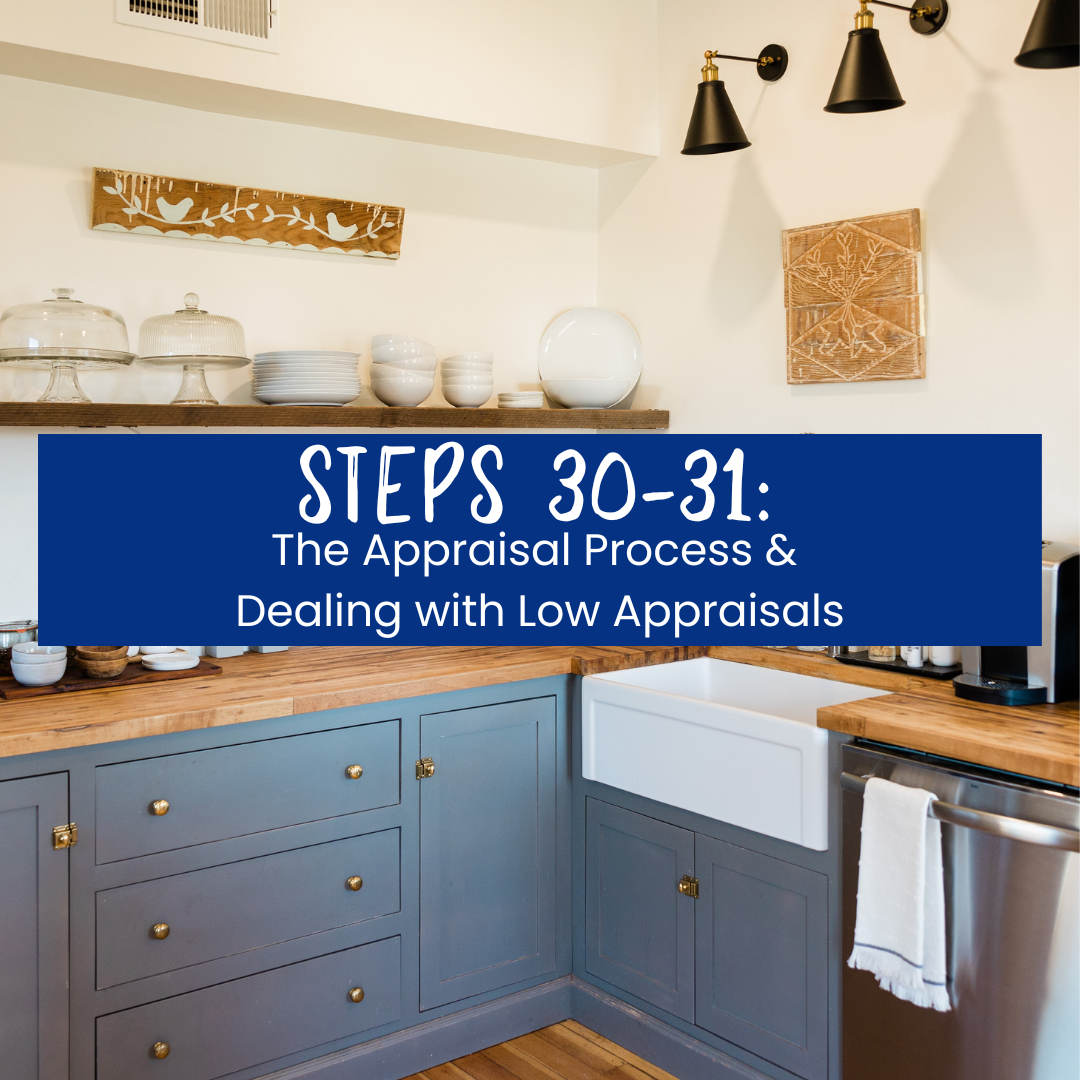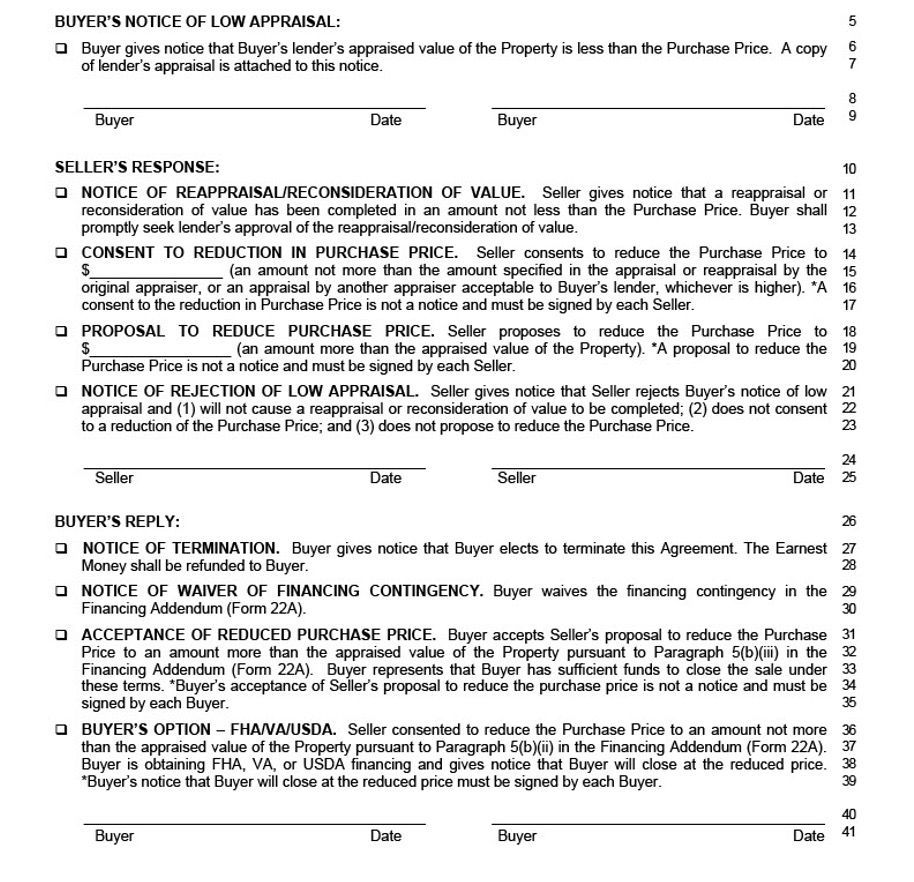Selling Steps 30-31: The Appraisal Process & Dealing with Low Appraisals

STEP 30
THE APPRAISAL OCCURS
If the Buyer is using a mortgage to buy your home, then the Lender will require that an appraisal be conducted.
Who orders the appraisal? The Buyer’s Mortgage Lender orders the appraisal, but the Buyer pays for it.
When does the appraisal occur? Usually, during weekday hours after the inspection negotiation has been resolved.
Do I need to attend the appraisal? No, you will not attend the appraisal. I will provide the comps and state our case as to why we think the purchase price is justified to the appraiser.
How long does the appraisal take? Usually about 30 minutes.
How long until we know if the property appraised for the purchase price? Usually, a week to 10 days after the appraisal appointment. Once the report is written, the Buyer’s Mortgage Lender forwards it to the Buyer to let the Buyer know whether the property appraised at the purchase price, below the purchase price, or above the purchase price.
If the property appraised at the purchase price, nothing further needs to be done, and the closing process will proceed forward as planned.
How Home Appraisals Work
By: SARAH SIDDONS | Feb. 22, 2021
You've found your dream home. The asking price is $700,000 -- an amount you've already been pre-approved for by your bank. But is the home really worth that amount? That's the question at the heart of the home appraisal. The worth, or value of the property, will determine how much a lender is willing to give you to buy that particular piece of real estate.
This all-important step in getting the financing you need is the home appraisal -- an oftentimes-confusing part of the mortgage process in which both buyer and seller must depend on the expert opinion of a stranger. A real estate appraisal is simply that -- the expert opinion of a certified, state-licensed professional who determines the value of a piece of property. If your $700,000 dream home is really worth only $600,000, then the home is overpriced.
A home appraisal also protects the bank from getting stuck with property that's worth less than they've invested. And it protects you from paying too much for a house simply because it was love at first sight. The home appraisal is a no-nonsense factor in a decision that is often emotional for the buyer.
A home appraisal is not the same thing as an inspection. If you're buying a home, you'll want to hire an experienced home inspector to point out any potential problems that could turn into costly nightmares in the future. Property appraisers will likely make note of any obvious issues, but they won't test your heat and air, check the chimney, or determine if your plumbing is up to code. That's the job of the inspector.
In this article, we'll take a look at the methods appraisers use to value property and find out what's included in the appraisal report. We'll debunk some common myths -- for example, will dirty dishes in the sink affect your home appraisal? What about a wet basement? We'll find out where the appraiser gets the information that determines the value of the property. And, if you get a low appraisal, what happens next?
Home Appraisal Methods
When you apply for a mortgage, your lender typically requires the property to be appraised by one of their approved appraisers. This practice helps create more consistent appraisals and gives you assurance that the appraiser is properly licensed and certified. Even though the home appraisal is the lender's requirement, it's the borrower's responsibility. You usually pay for it as part of the mortgage costs at the time of closing. The cost is typically around $900 but can be more depending on the price of the property.
There are two primary appraisal methods for residential property. In the sales comparison approach, the appraiser compares the property with three or four similar homes that have sold in the area, often called comparables, or comps. The analysis considers specific components, such as lot size, square footage of finished and unfinished space, style and age of the house, as well as other features such as garages and fireplaces.
The cost approach is used more for new property and is based on reproduction costs. The appraiser estimates the cost to replace the structure on the property if it were destroyed. The appraiser then looks at land value and depreciation to determine the property's worth.
The appraiser gathers information for the appraisal report from a number of sources, but the process often begins with a physical inspection of the property inside and out. Additionally, the appraiser may look at county courthouse records and recent reports from the local real estate multiple listing service.
The appraisal report generally includes:
- An explanation of how the appraiser determined the value of the property
- The size and condition of the house and other permanent fixtures, along with a description of any improvements that have been made and the materials used
- Statements regarding serious structural problems, such as wet basements and cracked foundations
- Notes about the surrounding area, such as new or established development, rural acreage, and so on
- An evaluation of recent market trends of the area that may affect the value
- A comparative market analysis that supports the appraisal
- Maps, photographs, and sketches
To learn more about what's included in the report, take a look at this property appraisal form from Freddie Mac, the second biggest provider of residential mortgages. If you have questions about any aspect of the appraisal, ask the appraiser for clarification.
A common misunderstanding is that the appraisal amount is only for the house itself. In fact, the figure appraises the total value of the home and any other permanent structures, along with the land that the house is built on. This appraisal figure also determines the loan amount you can get to buy the property.
Now you learn that your dream home is valued at $649,000 -- a full $51,000 lower than the asking price! Your lender won't loan more than the appraisal. So what do you do?
Recovering From a Low Appraisal
An appraisal of $649,000? The home seller learns that his $700,000 asking price is much higher than the actual property value. If you are the buyer, this figure means that the amount you can finance on the property is much lower than you expected. An appraisal value that is considerably lower than what you have offered should be a red light -- a warning that you may be paying too much for the property. So is the deal over? Is it time to panic and throw in the towel? Can anything be done?
First, take a look at what may have caused the low appraisal. It might be due to factors that the homeowner could correct, such as repairs or maintenance. If that's the case, the appraiser may be willing to take a second look and adjust the appraisal accordingly.
You always have the option to order a second appraisal. This may be a good idea if the first appraiser is inexperienced or unfamiliar with the area where the property is located. However, be sure to use an appraiser from a list recognized by the lending institution. It's possible that a second appraisal will uncover mistakes the first appraiser made. If you believe that an appraisal is simply not an accurate representation of the property's value, and the appraiser is not willing to listen to your concerns, you can go to your state's licensing agency for appraisers and file a complaint.
From the lender's standpoint, however, the mortgage transaction is at a standstill until something else happens. Perhaps the seller will lower the asking price or carry a second mortgage to make up the difference. Or, as the homebuyer, you may be willing to increase your cash down payment. It's possible that both buyer and seller can negotiate compromises that will satisfy the lender.
If, however, negotiations fall through and the appraisal is still too far below what the bank is willing to finance, then there's no choice but to cancel the transaction. You probably signed a purchasing contract stating your offer for the property, but it likely contains a loan contingency. This is a statement that allows you to cancel the contract and receive any deposit you paid the seller if you can't qualify to buy the property at the agreed terms.
A home appraisal is more than just another cost added to the buyer's bottom line. It's a protection for everyone involved in the home-buying process. It will help you make a more informed decision about purchasing a home.
Questions? Contact us at andi@andidyer(dot)com or 360-734-6479.
STEP 31
We Have Options!

Questions? Contact us at andi@andidyer(dot)com or 360-734-6479.

















